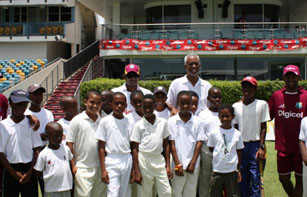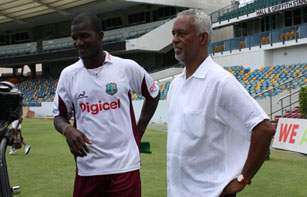
Feature Story
West Indies cricketers support UNAIDS vision of eliminating new HIV infections among children
11 April 2012
11 April 2012 11 April 2012
Members of the West Indies Cricket Team, photographed with children who participated in the Think Wise coaching clinic and Dr Ernest Massiah, Director of the UNAIDS Caribbean Regional Support Team.
Credit: UNAIDS
Hosting a group of local students at the Kensington Oval stadium in Bridgetown, Barbados, the West Indies Cricket Team expressed solidarity with the UNAIDS vision of zero new HIV infections among children. The coaching clinic was held as part of the Think Wise Campaign, a global partnership that uses the power and reach of cricket to address key HIV-related issues.
"We have the medicines, we have the knowledge. There is no need for any Caribbean child to be born with HIV,” said West Indies Captain Darren Sammy, who endorsed the call for preventing mother-to-child transmission (PMTCT) of HIV and ensuring access to life-saving treatment for HIV-positive women. “There is no need to treat anyone any differently because of their HIV status," he added.
The Think Wise Campaign—a partnership between UNAIDS, UNICEF, the International Cricket Council and the Global Media AIDS Initiative—places particular emphasis on HIV prevention as well as on the education and empowerment of children. Engaging young people in the HIV response was the focus of the coaching session in Bridgetown, which included a discussion around HIV.
We have the medicines, we have the knowledge. There is no need for any Caribbean child to be born with HIV
West Indies Captain Darren Sammy
"Through this event, the children have loved meeting their favourite players and learning some new skills. At the same time, they have gained awareness about HIV and the importance of treating all people with equal respect and compassion,” said Dr Ernest Massiah, Director of the UNAIDS Caribbean Regional Support Team. “Like the cricketers, these children can be agents of change in their families, communities and schools."
A regional Elimination Initiative—led by the Pan American Health Organization—aims to end mother-to-child transmission of HIV in Latin America and the Caribbean by 2015. The Eastern Caribbean, with its smaller disease burden, is expected to reach the target far sooner.

West Indies Cricket Captain, Darren Sammy, participates in media interviews with Dr Ernest Massiah, Director of the UNAIDS Caribbean Regional Support Team, at the Kensington Oval stadium in Barbados.
Credit: UNAIDS
At present, mother-to-child transmission of HIV accounts for between 8 and 10 per cent of all HIV infections in the Caribbean. However, some Caribbean countries have either achieved or are close to achieving elimination targets; between 2007 and 2010, for example, there were no new HIV infections recorded among babies in Barbados.
Widespread stigma and discrimination against people living with HIV remains a challenge for PMTCT programmes across the region. Stigma and the fear of unfair treatment prevent some HIV-positive mothers from accessing early antenatal care, abstaining from breastfeeding or making their babies available for follow-up testing and care.
"The Eastern Caribbean can eliminate mother-to-child transmission because we have the means to prevent it," Dr Massiah stressed. "West Indian people can play a part by addressing the negative attitudes and judgments associated with HIV. This would allow mothers across our region to feel safe and confident about accessing life-saving testing, treatment, care and support."



